Bedford.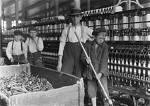
Born in Bedford, the county town of Bedfordshire, in 1938, I would have been conceived over the Christmas period of 1937.
My parents, Arthur & Florence had both been in the Lancashire cotton industry in the Blackburn area. (3) Arthur lived in Blackburn & Florence in Whalley, a distance of around 9 miles. They were both raised by Victorian parents in the Edwardian era. By the time I was two, their life had experienced World War 1 & they were at the beginning of World War 2. Their jobs were constantly under threat as the Lancashire Cotton industry went through it's boom & bust period & Bedford was where they went to find employment.
1938 was
the year before the outbreak of World War Two. I was about three weeks old, when
Neville Chamberlain returned to
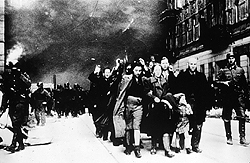 Britain from meeting with Adolf Hitler and
declares he has got "Peace In Our Time". I was two months old when Kristallnacht
occurred. In Germany, the "night of broken glass" begins as Nazi activists and
sympathizers loot and burn Jewish businesses (the all night affair sees 7,500
Jewish businesses destroyed, 267 synagogues burned, 91 Jews killed, and at least
25,000 Jewish men arrested). As my birth drew closer, war must have seemed to
threaten all normal folk. These poor people must have been astounded, as World
War One was described as "The war to end all wars". In '38 Adolf Hitler was Time
Magazine's "Man of the Year", an award that usually goes to the most influential
person of the year. The Spanish Civil war was still raging (1936/1939) & it was
the era of the Great Depression (it started in 1929 & went on to the 1940s). Oil
was discovered in Saudi Arabia. László Bíró patents the ballpoint pen in
Britain, it was the time of pen & ink or a pencil. Heavyweight boxing champion
Joe Louis knocked out Max Schmeling in the first round of their rematch at
Yankee Stadium in New York City. That upset Hitler! The white master race was
meant to win over black men, prejudice was alive & thriving across the world.
Steam was at its height as the steam locomotive Mallard sets the world speed
record for steam by reaching 126 mph.
Britain from meeting with Adolf Hitler and
declares he has got "Peace In Our Time". I was two months old when Kristallnacht
occurred. In Germany, the "night of broken glass" begins as Nazi activists and
sympathizers loot and burn Jewish businesses (the all night affair sees 7,500
Jewish businesses destroyed, 267 synagogues burned, 91 Jews killed, and at least
25,000 Jewish men arrested). As my birth drew closer, war must have seemed to
threaten all normal folk. These poor people must have been astounded, as World
War One was described as "The war to end all wars". In '38 Adolf Hitler was Time
Magazine's "Man of the Year", an award that usually goes to the most influential
person of the year. The Spanish Civil war was still raging (1936/1939) & it was
the era of the Great Depression (it started in 1929 & went on to the 1940s). Oil
was discovered in Saudi Arabia. László Bíró patents the ballpoint pen in
Britain, it was the time of pen & ink or a pencil. Heavyweight boxing champion
Joe Louis knocked out Max Schmeling in the first round of their rematch at
Yankee Stadium in New York City. That upset Hitler! The white master race was
meant to win over black men, prejudice was alive & thriving across the world.
Steam was at its height as the steam locomotive Mallard sets the world speed
record for steam by reaching 126 mph.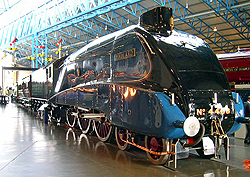
The basic industries of ship building, coal and textiles never recovered from the slump they were in at the end of 1920. By 1930 over 2 million people in Britain were unemployed and remained so until 1936. Even on the eve of war in 1939 there were still 1.25 million people without work. During the strife torn period there were 2 police strikes, a national rail strike, 2 national coal strikes, a 2 month ship builders strike, a 2 month engineering strike and violent demonstrations by the jobless. In 1926 in support of the Trades Union Congress there was a general strike. Possibly, all this was one of the reasons that Arthur's family had tried to make a new life in America. It is said his father brought the family back around the time of WW1 because he felt guilty that America stayed neutral & he needed to do his bit. He didn't join up, presumably because he failed the medical tests
They married in Whalley at St. Mary's church in March 1935. From bits of paper & diary notes, I gathered they had gone to a firm called Smarts on Victoria St. Manchester three days before their wedding and purchased household objects such as carpets, sideboard, bedstead etc for the sum of £61 2s 0d. (£61.10p) I would imagine this was a huge sum for a man who was going to become a labourer on about £4 a week. By the 22 July 1938 they had finished paying them & they were living in Bedford. The address given, on the final receipt for payment, was their in-laws address on the same road they lived.
I’m not sure who went to Bedford first, nor the year they moved, but I think it was Dad’s parents, Arthur Geoffrey & Naomi who went first. Their other son Ernest lived in Bedford too. I feel it must have been a family decision, in search of a better life. Why mum & dad bought goods in Manchester in 1935, whilst living in Blackburn and why they came to Manchester, in particular, after getting into the civil service in 1940, I have no idea. It must have been about May, as I was 18 months old when they moved back up north.
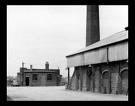 Grandparents, Arthur &
Naomi lived at 122 Mile Road in Bedford & I was born at 102, at twenty past one
in the morning in early September. Most of my life, my mother would point out
the marks of the forceps delivery on my forehead! I was christened Frank Alan.
The Frank came from the Naomi's maternal grand father Francis Luty (mum couldn't
take Francis) and a friend called Alan who worked in the brick yard with my
father. My family name was always Alan.
Grandparents, Arthur &
Naomi lived at 122 Mile Road in Bedford & I was born at 102, at twenty past one
in the morning in early September. Most of my life, my mother would point out
the marks of the forceps delivery on my forehead! I was christened Frank Alan.
The Frank came from the Naomi's maternal grand father Francis Luty (mum couldn't
take Francis) and a friend called Alan who worked in the brick yard with my
father. My family name was always Alan.
Arthur was working in Manchester in January 1941 & was posted to Harrogate in the August. Later on he transferred to Liverpool at un unknown date, before finally settling in the offices in Sale, Manchester, where he retired. The clues of where he was, came from diaries written in 1941/2. I gathered from my mum that through the depression years, Arthur’s only wish was for full employment, a steady income, followed by a good pension. He seemed to need the comfort of not being able to be sacked so he opted for the civil service for security. When you see what they lived through in his early years, there is no surprise there. I know that Arthur & Florence moved to Bedford to get Arthur work in the brickyards at Marston Mortaine. He was a labourer, setting up the bricks in the kilns.
I’d like to take this opportunity to reinforce the certain fact that, due to "Children are seen but not heard", some of this is guess work, some of the clues I picked up a bit at a time & some I got told. I do know one thing for sure ... I can’t be sure which bit is which!
In the parish magazine of St. Leonard church Bedford, recording my baptism, the adverts read, "A trial solicited", "Every assistance rendered to all classes", "Your patronage esteemed" 1938 was on the edge of another era. According to the adverts, a three-piece suite was £5, a complete bedroom suite was £4.50 and a portable gramophone from HMV was £1.65.
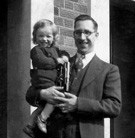 Of
course, the toys I think I got in Bedford must have gone with me to Manchester.
Dad got me (or him?) a clockwork 0 gauge Hornby train set. From a picture I
have, it looked like I was about one! There was a huge brown bear on four wheels
(called teddy ... of course) and Peter Panda. He was my best pal, and took all the
punishment a panda can take & he stayed with me for a long time. Think he
finally went to someone in Whalley. Of course, that could have been to get me to
grow up or they could have just dumped him!
Of
course, the toys I think I got in Bedford must have gone with me to Manchester.
Dad got me (or him?) a clockwork 0 gauge Hornby train set. From a picture I
have, it looked like I was about one! There was a huge brown bear on four wheels
(called teddy ... of course) and Peter Panda. He was my best pal, and took all the
punishment a panda can take & he stayed with me for a long time. Think he
finally went to someone in Whalley. Of course, that could have been to get me to
grow up or they could have just dumped him!
Bedford
always looked clean & modern to me in comparison to the streets of
Manchester. The whole place
had a very distinctive smell.
(4)
I’m sure it was the brickyards. I occasionally got
a whiff of it, as I drove down the motorway as a representative later in life,
attending a meeting or going to a show. It instantly brought back the memories
of Mile Road, with Cardington Hangers on the skyline (famous for the airships that
were held there). It had memories of relatives with very little sense of humour & being shouted at,
because I hadn’t learnt to tell the time.
 With hindsight, it is easy to see why
a child asked few questions & lived in a world of his own. "what time is it?" produced a bit of verbal abuse
about "You should be able to tell the time by now" or ask a school teacher where
Burma was, solicited accusations that you should have known that already! " How
do you spell sugar?" get you "it's about time you knew that! Get the dictionary
out & look it up!" Can I say now, in defence of dyslexics the world over, it's
bloody hard to use a dictionary when you can't spell! I can still see Auntie Anne taking her
violin into the front room & being made to practice by haranguing her. I
seldom recall anyone leading by encouragement. Maybe it was a hard life, maybe
the war or maybe learning by fear of punishment & ridicule was the natural order
of things?
With hindsight, it is easy to see why
a child asked few questions & lived in a world of his own. "what time is it?" produced a bit of verbal abuse
about "You should be able to tell the time by now" or ask a school teacher where
Burma was, solicited accusations that you should have known that already! " How
do you spell sugar?" get you "it's about time you knew that! Get the dictionary
out & look it up!" Can I say now, in defence of dyslexics the world over, it's
bloody hard to use a dictionary when you can't spell! I can still see Auntie Anne taking her
violin into the front room & being made to practice by haranguing her. I
seldom recall anyone leading by encouragement. Maybe it was a hard life, maybe
the war or maybe learning by fear of punishment & ridicule was the natural order
of things?
As a pleasant memory, there was that large open piece of grass in front of the grandparent’s house (not many of those in Moss Side!) and there was always the renewal of friendship with our nice next-door neighbours, the Linguards at number 100, with their son was Christopher & the daughter Marilyn. They were very nice big generous people.
As I left at 18 months old, to live in Manchester, I have no memory of living in Bedford. Bedford memories are of trips to see the Grandparents, when I was older. My mum raised me, dad being away most of the time, so my holidays were mainly with mum’s parents, Billy & Nellie Hebden in Whalley. I looked & acted as a Hebden. (Small, round faced and chubby!) I never felt much of a Lowe, so they were always vaguely uncomfortable visits to Bedford. There were always restrictions, I missed my friends and never felt truly welcome.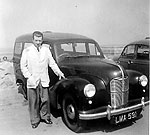
Of course in those days, a trip so far away was a major event. When we went in Uncle Harold’s Austin A40 van (husband of Anne, of violin fame) it was a days travelling, map reading all the way! “Northampton ... straight on” became one of those silly family sayings, that meant nothing outside the home!
Bedford was the smell, Cardington hangers and slightly miserable relations. At the time, I knew nothing of all the Italian immigrants or that Bedford was Glen Millers base in WW2. Bedford was as different to Moss Side, as Whalley was from Blackpool to me as a child. Funnily enough, I got that feeling of hostility, resentment & a cool stand offishness later, when a company I worked for much later in life, (Binney & Smith) had its headquarters in Bedford.The other time I visited Bedford, was to sign on in the RAF for three years in 1956. We reported to the base at Cardington!

 (3)
“The cotton industry in Lancashire”. My Great Grandfather, John (Jack) Lowe
must have experienced the Cotton Famine in 1863. I think this led to him moving to
America. His son Arthur Jeffery took my dad Arthur to America, to try & continue
in the cotton industry. This must have been a huge decision. The only way to get there was by
boat & that must have taken about a week. The story is that, they all came back
because of World War 1. They all returned to Lancashire, the only job they were
good at was cotton and between 1914 (the start of the war) & 1939 (The start of
the second World War) there were the years of boom & bust in the Lancashire
cotton industry. I wonder if this was the experience that led my dad to long for
security? To be able to go to work, earn money & not be laid off or sacked. He
was a skilled cotton worker. Nevertheless, he moved south to Bedford to work as
a brick labourer. The diaries I have, always note his earnings. Having a new
wife & family, being employed must have been extremely important to him. He
always told me he became a civil servant because they couldn’t sack him once he
became established. The full history of the cotton industry can be found here.
(3)
“The cotton industry in Lancashire”. My Great Grandfather, John (Jack) Lowe
must have experienced the Cotton Famine in 1863. I think this led to him moving to
America. His son Arthur Jeffery took my dad Arthur to America, to try & continue
in the cotton industry. This must have been a huge decision. The only way to get there was by
boat & that must have taken about a week. The story is that, they all came back
because of World War 1. They all returned to Lancashire, the only job they were
good at was cotton and between 1914 (the start of the war) & 1939 (The start of
the second World War) there were the years of boom & bust in the Lancashire
cotton industry. I wonder if this was the experience that led my dad to long for
security? To be able to go to work, earn money & not be laid off or sacked. He
was a skilled cotton worker. Nevertheless, he moved south to Bedford to work as
a brick labourer. The diaries I have, always note his earnings. Having a new
wife & family, being employed must have been extremely important to him. He
always told me he became a civil servant because they couldn’t sack him once he
became established. The full history of the cotton industry can be found here.
 (4)
“Bedford” It always seemed a miserable town to me.
(4)
“Bedford” It always seemed a miserable town to me.
